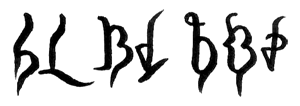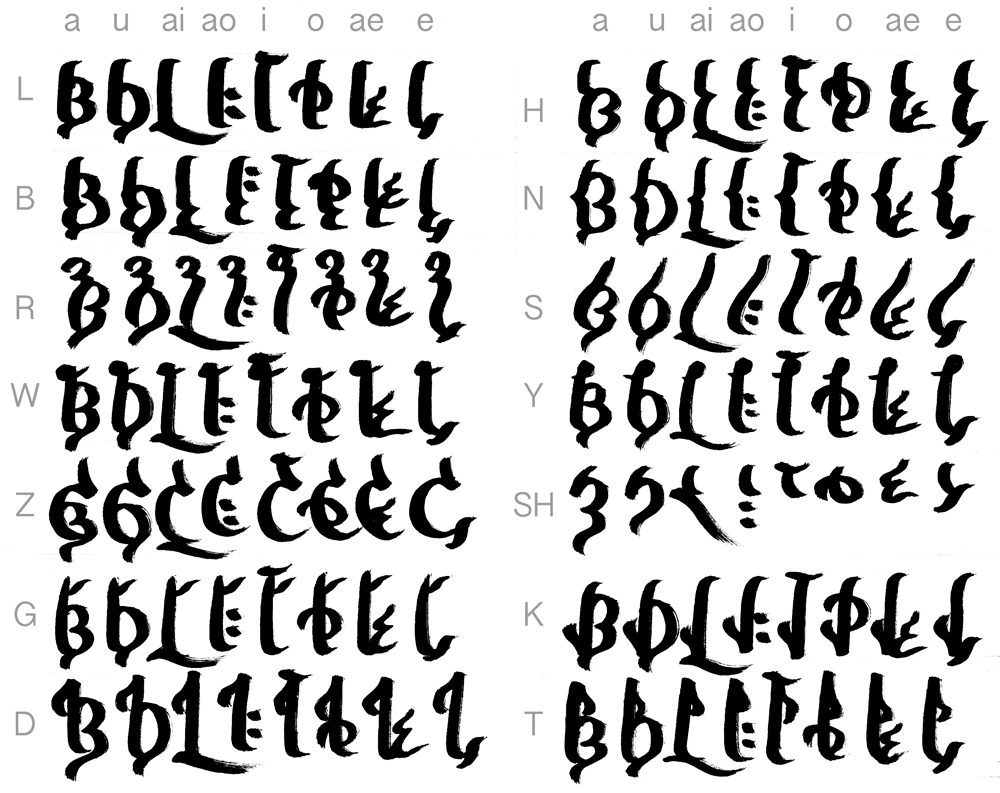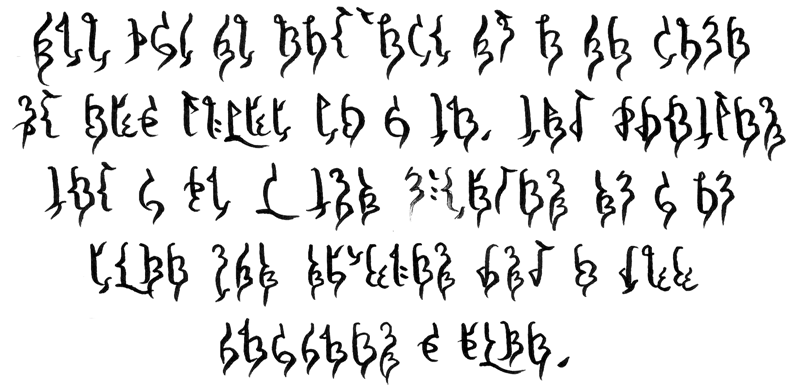The Language at the Fire

| DATE | Feb 2023 - August 2023 |
| RELATED |
Initially developed by Spire and fleshed out by me. The sister language to Language of the Lords, spoken by a ruling caste of demons and their enslaved angels. Language at the Fire is spoken solely by angels.
Angelic speech emphasises praising others and always centres the person being spoken to, even if they are not the subject of discussion. Flowery descriptions are always expected to surround the matter at hand. As a result, the Language often seems repetitive and ostentatious. Leaving out the decorative speech makes a sentence sound terse.
The name "Language at the Fire" comes from the sharing of stories around a fire. The "base" name for the language is susai ake wunako, but speakers like to expand this name to ridiculous lengths. For example, someone might say that they speak koraki tewati-susai-la, shidunu zu ade, ake wuhu wunako-la, babi zu oyushai, "flowing language, poetic and rich, at the bright fire, warm and friendly".
Phonology
The angelic language lacks most labial sounds (p, f etc) due to their difficulty to reproduce with a beak. While some labial sounds are used while in bipedal form (b, w), they are replaced with hisses and clicks when spoken in quadrupedal form. Other consonants also shift when speaking with a beak.
For ease of reading, all example words and sentences will be written in bipedal angelic.
|
|
|
||||||||||||||||||||||||||||||||||||||||||||||||||||||||||||||||||||||||||||||||||||
* "ss" marks a hissing sound.
Vowels and consonants cannot follow each other and syllables may only be constructed as (C)V. Any vowels written in English that are next to each other should be read as a diphthong.
Word construction
Most words are derived from relevant consonant clusters. For example, the root N-S-SH, "of an aquatic nature", gives rise to words like nisasha ("water"), nososhu ("river"), and naosashe ("reed").
Words derived from consonant clusters are often added to non-cluster words to add flavour and context. For example, turu ("fish") is understandable on its own, but is often replaced by nisasha-turu ("water fish") or nososhu-turu ("river fish") as fish are also of an aquatic nature. Angels love to overdescribe, so they always take any chance they get to add an additional descriptor.
| EXAMPLE CLUSTERS |
MEANING | EXAMPLE WORDS |
| F-N-K | related to fire |
|
| S-B-T | related to beasts |
|
| T-W-T | related to communication |
|
Pronouns
There are no gendered pronouns in the Language. Instead, pronouns mostly relate to whether someone is involved in the current conversation/social group or not. This can be used creatively to include or exclude people.
| SUBJECT | OBJECT | POSSESSIVE | |
| 1st person singular | sa | sari | sawe |
| 2nd person singular (in group) | ro | roni | rowe |
| 2nd person singular (outside group) | roru | roruni | roruwe |
| 2nd person singular (in group, new listener*) | roro | roroni | rorowe |
| 3rd person singular (in group) | ri | riza | riwena |
| 3rd person singular (outside group) | riru | riruza | riruwena |
| 2nd person plural (in group) | roshao | roshani | roshaowe |
| 2nd person plural (outside group) | roshaoru | roshaoruni | roshaoruwe |
| 3rd person plural (in group) | rishao | rishazu | rishaowena |
| 3rd person plural (outside group) | rishaoru | rishaoruni | rishaoruwena |
* This pronoun is used when the speaker is talking to a new person within the group. For example, the speaker might address one listener in particular, using ro, but then turn to another listener and use roro, specifying that they are no longer talking to the first listener. Minute clarifications like this are extremely common in the Language.
Overuse of "you", however, can sound rude. Angels elect to call others an endearing term such as "my friend" by default. Depending on the situation, the speaker may place the listener in higher and higher esteem to emphasise a good will and eagerness to extend hospitality. For example, once the clarifying roro is used to introduce a new listener, a speaker may switch to "dearest" or "leader" (a term not strictly reserved for those actually in positions of power). Demons often mistake this cultural quirk for a display of submission.
Locatives
Locatives are used to centre any sentence around the person being spoken to. The locative is always a suffix attached to every noun, pronoun, and verb in the sentence.Angel culture is very concerned with lifting up others and making them feel important. This constant centring of others is just another facet of meandering angelic speech.
Locatives are also included in written texts and can be used to make the reader feel more intimate with or distant from the writer.
| SUFFIX | MEANING | USE |
| -la | near you or toward you |
|
| -lu | toward a third party |
|
| -lau | far from you |
|
| -lara | not here |
|
| -ala* | before this conversation |
|
| -alao* | after this conversation |
|
* Note that these suffixes do not mark tense. The relevant verb must still be conjugated correctly in addition to using the suffix.
-
Language: sa-la hai-lu roni
English: "I see you"
Transliteration: I.near-you see.toward-you you(object, in-group) -
Language: riru-lara henai-ala denogae-la
English: "they saw a dog"
Transliteration: they(out-group).not-here saw.previously dog.near-you
Noun phrases
A basic noun phrase always includes at least one preceding adjective to set the tone, and then any additional adjectives afterward to further specify the noun's qualities. To use only a preceding adjective comes across as the noun being basic or plain.
| MEANING | POSSIBLE ANGELIC PHRASE |
| an apple | wonderful (fruit-)apple zugashe hitako-babo |
| a good apple | wonderful (fruit-)apple, red and crisp zugashe hitako-babo, kaosai zu keka |
| a bad apple | apple babo |
| just an absolute bottom of the barrel shit tier apple* | bad apple kuko babo |
| this apple kills people and it's coming for you next | horrible apple, yucky and oozing hesa babo, uda zu shaneshi |
* Spire is so funny.
Only nouns act this way; pronouns and proper nouns do not need a preceding adjective. This means that the previous example sentence "they saw a dog" would actually be constructed as follows:
-
Language: riru-lara henai-ala aida denogae-la
English: "they saw a dog"
Transliteration: they(out-group).not-here saw.previously excellent dog.near-you
Again, this doesn't mean that the dog is considered particularly excellent by the speaker. The baseline for quality in the Language is higher than in English, and lack of a preceding complimentary adjective would imply that the dog is bad in some way. If the speaker wanted to compliment the dog, they could say something like the following, which includes a clarifying compound word:
-
Language: riru-lara henai-ala aida sibatu-denogae-la, aesha zu waiwe
English: "they saw a good dog"
Transliteration: they(out-group).not-here saw.previously excellent animal.dog.near-you, proud and strong
Listing things
The Language has multiple words for "and" depending on what is being listed. The "and" comes after the first word in the list, no matter how long the list is, eg. kokuna zai eti shashaone gasi, "a demon, imp, cherub, and angel".
| ANGELIC | MEANING |
| zu | listing adjectives |
| zai | listing people or things |
| zo | listing verbs or joining sentences, "and then" |
Imperatives and requests
While a standalone imperative tense does exist in the Language, it would only be used in very rare circumstances. In every day use, the imperative must be formed as a request with the addition of wayuni- (literally "request") before the verb.
- CORRECT BUT RUDE: zewushene, "explain"
- POLITE: wayuni-zewushene, "explain"
Additional locatives can add nuance to the command.
- wayuni-zewushene, "explain"
- wayuni-zewushene-la, "explain (for my benefit)"
- wayuni-zewushene-lu, "explain (for the benefit of others)"
- wayuni-zewushene-lara, "explain (I'm really sorry for not already understanding)"
- wayuni-zewushene-alao, "explain (at some point)"
Additional sentence elements
It is common for angels to introduce new information with one of a handful of set phrases, which can generally be translated as "as you know" or "you are aware that". These phrases don't have to be true (and rarely are) and instead act as yet another way for the speaker to lift up the listener, declaring that whatever the speaker has to say won't be news to the listener.
- nata gaonai-ala, "it's already known that..."
- nara haene-ala, "as seen before this conversation..."
- nata [ro] gaora-la, "[you] already know that...
Let's add this to our ever-growing dog sentence!
-
Language: nata ro gaora-la, riru-lara henai-ala aida sibatu-denogae-la, aesha zu waiwe
English: "they saw a good dog"
Transliteration: already you(in-group) know.toward-you, they(out-group).not-here saw.previously excellent animal.dog.near-you, proud and strong
But let's make this sentence really angelic. It could be that the speaker has already referred to the listener as "you" a couple of times, and any more would be rude. So we get:
-
Language: nata babu ozuse sawe gaora-la, riru-lara henai-ala aida sibatu-denogae-la, aesha zu waiwe
English: "they saw a good dog"
Transliteration: already good friend mine know.toward-you, they(out-group).not-here saw.previously excellent animal.dog.near-you, proud and strong
Example sentences
To compare the difference between the Language of the Lords and the Language at the Fire, let's translate this demonic nursery rhyme into angelic:
- Demonic: ditke ditsi dadna ditshi nakna ditni dot'kan dag'ka
English: An imp and a cherub drank sand from a glass and choked.
Transliteration: imp.people cherub.angel both sand.material from glass.tool drink.past.then choke.past
- Angelic: sadewe ozuse sawe, wayuni-shiyazene sari ya sa-la zewusha-la roni bagaezo tiwaotai-gaege, tebu zu eda. etaki kokuna-eti-lara, enani zu bode, zai eroha shashaone-gasi-lara, hasha zu yusha, genai-ala resaha hagoshe-baedao-lara koraki, ba kewaebae sudazu-suda-lara zo gohai-ala.
English: An imp and a cherub drank sand from a glass and choked.
Full translation: My patient friend, please allow me to tell you an interesting story, short and fine. A brave imp, small and loud, and a beautiful cherub, round and quiet, drank golden flowing sand from a shining goblet and choked.
Transliteration: patient friend mine, request-allow(imperative) me what i.near-you explain.toward-you you interesting narrative-story short and fine. brave demon.imp.not-here, small and loud, and beautiful angel.cherub.not-here, round and quiet, drink.past.previously golden desert.sand.not-here flowing, from glowing goblet.glass.not-here and choke.past.previously
It is very typical of angelic poems or narratives to begin with an introductory sentence of some kind, even if the story is short, to prepare the listener for a tale. Seemingly extraneous details, like descriptions of the characters in the story, are considered vital in angelic story-telling; it is the speaker's job to create a full picture for the listener and simple stories with barebones adjectives are considered poor. By contrast, demonic story-telling is more interested in alliteration, wordplay, and rhthym. A demonic narrative should be something you can clap along to.
Writing system
The Language's writing system is an alphasyllabary, where syllables are written as units with a main consonant letter and a secondary vowel component. This writing system was fully designed by Spire, with only some input from me on construction.
Vowels without an accompanying vowel are written with an "empty" consonant.

Writing examples
Below is the full passage about the imp and cherub drinking sand:

koraki tewati-susai-la, shidunu zu ade, ake wuhu wunako-la, babi zu oyushai, "flowing language, poetic and rich, at the bright fire, warm and friendly":

nata gaonai-ala sa-la tahine-la roni, "(it is known that) I love you":
